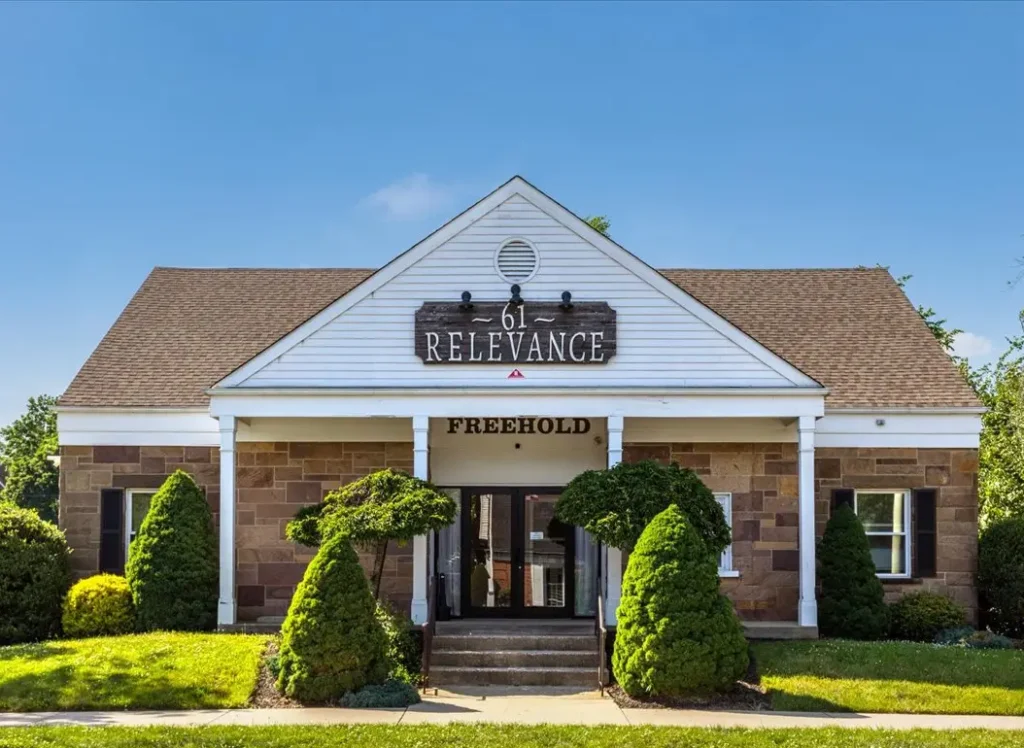Discover how Relevance Recovery utilizes modern advances to assist our clients on the path to recovery from addiction and mental health struggles.
Helping a loved one face their addiction can be one of the most difficult—and most important—steps you’ll ever take. Many individuals struggling with benzodiazepine dependence or other substance use disorders may be unaware of the severity of their problem or feel too fearful or ashamed to ask for help. That’s where a professionally guided intervention can make all the difference.
At Relevance Recovery, we offer specialized intervention services to help families and friends motivate their loved ones to enter treatment in a supportive, nonjudgmental way. Our experienced interventionists provide planning, coaching, and on-site facilitation to ensure the conversation is productive and compassionate rather than confrontational. By focusing on empathy, clear communication, and concrete next steps, we help families break through denial and guide their loved one toward accepting treatment.
Whether you’re preparing for an intervention for the first time or have tried before without success, our team can help you design a plan that feels safe, respectful, and effective. With our guidance, you don’t have to navigate this process alone—Relevance Recovery is here to support you and your loved one from the very first conversation through admission into care and beyond.










We work with most major insurance carriers to help provide affordable, accessible treatment options to those who need it most. Our admissions coordinators can answer all of your questions. Call for a confidential assessment and insurance verification.





















Interventions are often the bridge between denial and acceptance of help. Many people living with substance use disorders or mental health conditions don’t recognize the severity of their situation, feel ashamed to ask for support, or believe they can manage on their own. A well-planned intervention provides a structured, compassionate way to break through these barriers. By bringing together family members, friends, and sometimes employers or other key supporters, an intervention creates a safe environment where concerns can be expressed honestly and respectfully—opening the door for the person to see the impact of their behavior and consider treatment.
Interventions also provide clarity and direction at a time when emotions run high. Without guidance, conversations about addiction can quickly become confrontational or unproductive. Professional interventionists help families prepare beforehand, craft messages of support rather than blame, and outline clear treatment options. This preparation minimizes conflict and maximizes the likelihood of a positive outcome, turning a difficult conversation into a turning point for everyone involved.
Beyond motivating someone to accept treatment, interventions can strengthen the family system itself. Addiction affects more than just the individual—it strains relationships, erodes trust, and leaves loved ones feeling helpless. By involving family members in the process, interventions give them a voice, provide education about addiction as a disease, and establish healthier communication patterns that continue throughout treatment. This shared understanding improves not only the chances of entering rehab but also the individual’s long-term recovery support network.
Ultimately, interventions play a critical role in setting the tone for recovery. They mark the first step in a continuum of care, moving a person from crisis toward professional treatment and healing. By showing the individual that help is available and that loved ones are united in their concern, interventions can transform feelings of isolation into hope. When paired with an immediate plan for admission into a program—such as the benzodiazepine addiction treatment services at Relevance Recovery—interventions can dramatically improve the likelihood of successful engagement in treatment and long-term sobriety.
Professional interventions are more than a one-time meeting—they’re a structured process designed to help someone accept treatment in a supportive, nonjudgmental way. At Relevance Recovery, we guide families and loved ones through each stage to maximize the chance of success.
Initial Consultation & Planning
The process begins with an initial consultation between the family and a trained intervention specialist. During this stage, the specialist learns about the loved one’s history, substance use, and treatment needs. Together, the group develops a clear plan for the intervention, including who will participate, what will be said, and how potential objections will be addressed. This planning stage lays the foundation for a smooth and effective intervention.
Education & Preparation
Before the meeting takes place, participants receive coaching on addiction, mental health, and effective communication strategies. Each person prepares a personal statement expressing concern, love, and specific examples of how the addiction has affected them. With the interventionist’s guidance, the group frames these messages in a supportive, non-blaming tone to reduce defensiveness and encourage openness.
The Intervention Meeting
The intervention itself is held in a private, neutral, and calm setting to create a safe environment. The interventionist facilitates the conversation, keeping it on track and ensuring everyone has a chance to speak. During the meeting, the group presents its concerns, outlines the consequences of not seeking help, and offers a clear, immediate treatment option—such as entering a program at Relevance Recovery. This structured approach transforms a difficult conversation into a compassionate turning point.
Immediate Transition Into Treatment
If the individual agrees to accept help, the interventionist and family coordinate all logistics for admission, transportation, and intake so the person can enter treatment right away. In cases where the individual resists, the interventionist helps the family establish next steps and maintain healthy boundaries while continuing to encourage treatment. This ensures that, even if acceptance isn’t immediate, the family remains supported and empowered.
Ongoing Support for Families
Interventions don’t end once the person enters treatment. Families receive ongoing guidance and resources to support their loved one during treatment and beyond. Education about relapse prevention, self-care, and family therapy strengthens the support system and improves long-term recovery outcomes. At Relevance Recovery, we believe empowering families is just as important as helping the individual, because a strong support network can make all the difference in sustained sobriety.




When considering an intervention to help a loved one with drug or alcohol addiction, there are a few essential steps to help guide the process and increase the chances of success.
An intervention is supposed to be a conversation in which people who know, trust, and care for the addicted person come together to persuade them to seek help. Those who participate in the intervention should be chosen with care. This ensures that those present have a meaningful relationship with the addicted person. People who don’t have a good relationship with the addicted person should be asked to stay away.
You will want to talk to your loved ones when they are sober or as close to sober as possible. Discussing addiction and its negative impacts with a person when they are high or impaired may not be as productive as desired. Drugs and alcohol reduce a person’s ability to think clearly, react calmly, register, and effectively understand everything that’s being said.
Although it may be highly tempting to hold an intervention at home, it is often ineffective. At the family home, the person can retreat to their bedroom or bathroom when the conversation begins, closing the lines of communication before any progress is made. Holding an intervention in a neutral space can reduce these issues and eliminate any negative or tense feelings from previous conversations in the same area.
An intervention ends as soon as the person agrees to enter treatment. The conversation is designed to bring the family together just long enough for the addict to agree treatment is the best option. Consequently, the order of speakers is important. Allowing the right person to speak at the right time can lead to a successful, sometimes immediate, end to the intervention.
During an intervention, emotions can and do run high. People can quickly lose their train of thought, forgetting what they had planned to say and how they intended to say it. Holding rehearsals (several of them) makes this less likely. Practicing helps people deliver and stand behind their statements at critical times when they need to be said. Rehearsals can also help family members and intervention participants roleplay and prepare for angry words or other potentially negative emotions from the individual with the addiction.
An intervention script can take hours and sometimes days to create. Participants carefully detail everything they want to say, the words they want to use, and how they present their thoughts and emotions. If you have rehearsed, you know your script well, and so do the other intervention participants. Adding any surprise element into the intervention can make everybody feel uncomfortable.
Non-verbal communication with your loved ones during an intervention is almost as important as what you say aloud. It is important to be sure that your body language is open, warm, and welcoming. It is essential to focus on body posture elements such as keeping your arms and legs uncrossed, your hands unclenched, tilting your shoulders toward the person you’re speaking to, and leaning in for emphasis. It is also critical to look at the person you are talking to.
Successful interventions have an overall tone of caring and compassion. Maintaining a level head can be difficult, but don’t allow the addicted person to start a fight, change the subject, or drop the addiction issue altogether. It is also essential to resist the urge or temptation to blame, argue, or launch counterattacks against any hurtful words the addicted person may use.
When confronted by family members during an intervention, those with an addiction can act in unpredictable, sometimes negative ways. Depending on the individual, they may choose to leave the room, cry hysterically, say ugly and hurtful things that aren’t true or yell and scream. For these reasons, it is beneficial to develop a backup plan should your intervention not begin as rehearsed.
While interventions successfully convince many who struggle with addiction to seek help, available statistics do not indicate how many times a group must come together before their loved one agrees to rehab.
Don’t give up if you don’t see immediate results from your first intervention session. Treatment works and interventions can persuade people to make the needed changes to achieve sobriety and recovery.
Our expert admissions coordinators will create a custom plan for you.



Finding the right intervention specialist can make all the difference in motivating a loved one to seek treatment. In New Jersey, families have access to a range of professionals who are trained to plan, guide, and facilitate interventions with compassion and expertise. The key is to choose someone who understands addiction, mental health, and family dynamics—while also being familiar with local treatment resources.
Look for Credentials and Experience
Begin by researching specialists who hold relevant certifications, such as Certified Intervention Professional (CIP) or Licensed Clinical Alcohol and Drug Counselor (LCADC). These credentials demonstrate training in ethical practices, crisis management, and evidence-based intervention techniques. It’s also important to ask about the specialist’s experience with your loved one’s specific substance, such as benzodiazepines, since each addiction presents unique challenges.
Evaluate Approach and Fit
Interventions are most effective when they’re supportive rather than confrontational. During your initial consultation, ask how the specialist prepares families, frames messages, and handles resistance. A good interventionist will provide education and coaching for family members before the meeting, offer clear treatment options, and help coordinate immediate admission if your loved one agrees to enter care.
Consider Local Resources and Networks
Choosing a New Jersey–based intervention specialist offers the added benefit of local knowledge. These professionals are often connected with reputable treatment centers, detox programs, and outpatient services in the area—such as Relevance Recovery—making the transition from intervention to treatment seamless. They can also recommend support groups and aftercare programs for families during and after treatment.
Trust Your Instincts
Finally, trust your instincts when selecting an intervention specialist. The process requires openness and trust between the family, the professional, and the person needing help. Choose someone who communicates clearly, treats everyone with respect, and makes you feel supported throughout the process. With the right intervention specialist by your side, you’ll have a partner to guide you through one of the most important steps toward your loved one’s recovery.



Reaching out for help is a courageous first step, and you don’t have to do it alone. Whether you’re seeking support for yourself or looking for guidance on how to help a loved one, the team at Relevance Recovery is here to listen without judgment, answer your questions, and walk you through the next steps. From interventions and detox to residential and outpatient care, our compassionate professionals will help you find the right level of treatment for lasting change.
Our admissions team is available to verify insurance, explain program options, and coordinate a smooth, confidential intake process so you can start getting help right away. Call us today or fill out our secure online form to speak with a specialist about our benzodiazepine addiction treatment programs in New Jersey. Your journey to recovery can begin with a single conversation—let Relevance Recovery be your trusted partner in healing.